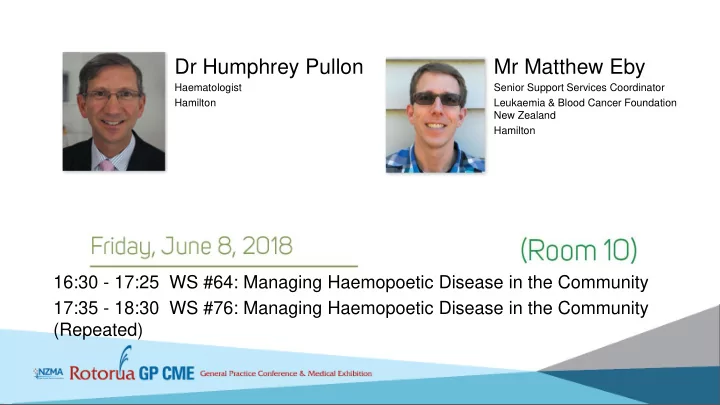

Dr Humphrey Pullon Mr Matthew Eby Haematologist Senior Support Services Coordinator Hamilton Leukaemia & Blood Cancer Foundation New Zealand Hamilton 16:30 - 17:25 WS #64: Managing Haemopoetic Disease in the Community 17:35 - 18:30 WS #76: Managing Haemopoetic Disease in the Community (Repeated)
Leukaemia & Blood Cancer New Zealand Support Services
Leukaemia & Blood Cancer New Zealand Psychosocial support Education Practical Assistance Advocacy Research
Leukaemia & Blood Cancer New Zealand Every Day Every Week LBC provides individualised LBC distributes over 36 support to over 50 patients financial assistance or family members vouchers Every Year Every Year LBC actively supports over LBC holds over 220 4,000 patients and their education and support groups whānau
Information and Resources
LBC’s Online Presence Website – includes PDFs of all our information booklets, children’s books and • fact sheets as well as resources for health professionals. Referral Forms – now available on our website for easy submission online. • Facebook groups - a forum for patients to connect. • - Myeloma patients group - Lymphoma patients group - Chronic Leukaemias - Acute Leukaemias - Carers group
Research and Travel Grants What do you need to apply? Quotes for any expenses associated with the activity, including accommodation, flights ▪ and other travel, conference registrations, and other expenses for which you are applying for funds. A copy of the abstract for the paper or poster you are presenting at the conference, if ▪ you are presenting. A letter of recommendation from your Clinical Director or Academic Supervisor. The ▪ letter of support should be detailed and outline the benefit for you to attend this event/conference. Details of the conference or workshop you are planning to attend (in the form of a ▪ conference programme or something similar). A brief outline of your contribution to the haematology field and why this conference ▪ would benefit your work. www.lbcgrants.org.nz
2017 Nationwide Survey Our goals 1. What are the challenges faced by our patients and carers? 2. What needs arise from these challenges? 3. What kinds of support do people need? 4. How well is LBC meeting these needs?
Survey Results Survival and Survivorship People with a blood cancer or blood condition need support in two broad areas; Survival and Survivorship . What this means and looks like for both patients and carers differs dependent on what stage of the cancer journey they are at.
Survival Types of support as needed by stage
Education and Information When did you most need information?
Emotional Support When did you most need emotional support?
Survivorship When did you most need survivorship support?
Survivorship Most patients needed information, someone to talk to and encouragement/ assurance to help them address: Lack of energy/ fatigue (52%) • Protecting or improving my sense of wellbeing (42%) • Thinking about future treatment, including towards the end of life • (42%)
Survivorship Other ways LBC can help Educate more about the condition and treatment options – what to • expect and how to prepare (in collaboration with health professionals). Educate about side effects and late effects • Assistance with making choices • Support those feeling isolated and to help connect with others • going through a similar experience. Assistance to cope with stress, fear and anxiety • Source more resources to ensure practical needs are met. • Help organise transport and provide vouchers to help meet costs • Initiate survivorship and rehabilitation programmes •
Health Professional Interviews Main causes of non referral are: Absence or low-visibility of policy and operating procedures • What services LBC and community care are able to offer • No knowledge of correct referral procedure •
Summary How to best help the haematology patient Reach more people at diagnosis • Provide more in-person support • Develop LBC’s relationships, profile and influence with key service • providers and networks More support for carers • Segmenting support services •
Thank you Any questions?
Recommend
More recommend